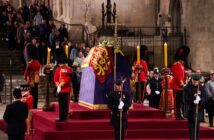Political cartoonists have been depicting global problems for centuries making make us laugh out loud, provoke action or leave us reeling in shock.
Now a group of academics from The Open University, Kings College London and a Philippines cartoon collective called Pitik Bulag, are staging a competition to demonstrate world issues through cartoons.
The history books tell us how leaders past and present have been called to account and enraged at cartoonists that spoke the truth through the poison pens of artists.
This present-day initiative comes in advance of the Pulitzer Prize for Illustrations and Cartoons being announced on 6 May.
Dr Precious Chatterje-Doody, a Senior Lecturer in Politics and International Studies at the OU, says the project is bringing together academics and artists in a bid to show the public how research on global challenges can be quickly communicated via cartoons.
From 5-7 June, the winning designs will be revealed at the British International Studies Association conference in Birmingham’s Hyatt Hotel in the city’s Centenary Square.
Precious said:
“This initiative has the capacity to change the way we think about the global challenges of the day, and how we can work together to address them.
“Academics can spend their entire careers working to solve big social problems, but struggle to communicate their work to everyone else.
“While artists often use their art to engage the general public they don’t necessarily have access to the latest research on the issues that concern them. This initiative brings both sides together, to work for common causes.”
The six cartoons in the exhibition will encapsulate the combined experiences of hundreds of people that feature in academics’ research over the course of several years.
Pitik Bulag was set up in 2019 and uses cartoons to promote truth, freedom of expression, and democracy. They collaborate with #FactsFirstPH, an initiative to fight disinformation in the Philippines, where press manipulation has been a big problem since the martial law regime of Ferdinand Marcos in the 1970s.
Precious said:
“In looking at this exhibition of six images, you’ll be let into real stories of real people across the globe that you might never otherwise encounter.”
She added:
“Visual images are a really effective way of grabbing people’s interest and conveying a huge amount of information in record time. We know this from how memes circulate.
“This project gives a more focused and positive use for images in an age of information overload. It brings academics out of their ivory towers to communicate in ways that the majority of people can get on board with, regardless of country, language, background knowledge, or any other factor.”
The exhibition will also feature at Creative Interactions at the Foundling Museum, London from 20-22 June, the Kirkleatham Museum in Redcar over the summer, and the British Association for the Study of Religions Conference in Leeds, 2-4 September.
The project is part of the OU’s Open Societal Challenges Programme, which aims to tackle some of the most important societal challenges of our time through impact-driven research that will transform lives and drive societal change.
It is also being supported by the British Association for the Study of Religions.
Cartoon by Isang Tasang Kape of Pitik Bulag



